Reading grammar schools 11+ (11 plus) guide

Are you considering a grammar school in Reading for your child? We’ve collated everything you need to know about admissions in 2025–2026. Keep reading to:
- Find out more about grammar schools in Reading
- Learn about each school’s entrance exam
- Discover which subjects your child will be tested on
- Plus, get exclusive resources to help your child prepare!
Which schools in Reading use the 11 plus?
There are two grammar schools in Reading which use the 11 plus exam to assess children for entry. Reading School is a boys’ grammar school and Kendrick School is a girls’ grammar school.
Reading Girls’ School is a partially-selective state school for girls. While most places are not academically-selective, children can take an entrance exam to apply for a place on the school’s selective stream.
Dates for your diary
- Tuesday 1st April 2025: exam registration opens for Reading School
- Thursday 1st May 2025: exam registration opens for Kendrick School
- Tuesday 1st July 2025: exam registration closes for Kendrick School
- Friday 13th July 2025: exam registration closes for Reading School
- Friday 5th September 2025: Reading School 11+ entrance exam
- Friday 19th September 2025: Kendrick School 11+ entrance exam
- Mid-October 2025: parents receive exam results for Reading School and Kendrick School
- Friday 31st October 2025: national deadline to apply for secondary school places
- Monday 2nd March 2026: national school offers day
Reading Girls' School has not yet released application dates for the selective stream test.
What is the 11 plus?
The 11 plus is an academic test. Grammar schools use the results of the test to decide whether to offer a child a place at the school. Children who are working in the top 25% of their year group are generally more likely to do well in the 11 plus exam.
Children can only take the test once per academic year, in September while they are in Year 6.
You might also be considering grammar schools in other local authorities. These schools have different exams and admission processes:
- Grammar schools in Buckinghamshire: Buckinghamshire Secondary Transfer Test
- Grammar schools in Slough: Slough Consortium of Grammar Schools 11 plus
What's on the 11 plus in Reading?
The three selective state schools in Reading use different 11 plus assessment papers.
Kendrick School
Girls applying for a place in Year 7 at Kendrick School sit 11 plus tests provided by GL Assessment. There are two one-hour papers which assess English, maths, verbal reasoning and non-verbal reasoning. All of the questions are multiple-choice.
Learn more about applying to Kendrick School.
Reading School
Please note: The format and content of the 11+ exam at Reading School may be changing from September 2025. Any changes will be communicated on this page in May 2025.
Boys applying for a place in Year 7 at Reading School take an 11 plus exam provided by Future Stories Community Enterprise (FSCE). This consists of three papers: English, maths, and creative writing. There are a variety of question types, including multiple-choice, free response, and written answers.
Learn more about applying to Reading School.
Reading Girls’ School
Girls applying for a place on the selective stream at Reading Girls’ School take an online entrance assessment known as Cambridge Select Insight. The test takes one hour to complete and tests verbal, non-verbal and numerical ability. It used to be known as CEM Select.
Learn more about applying to Reading Girls’ School.
Is your child ready for the 11+?
See where they stand in minutes. Atom’s free 11+ baseline tests give you an instant breakdown of their strengths and gaps. Know exactly what to focus on next and start preparing with direction, not uncertainty.
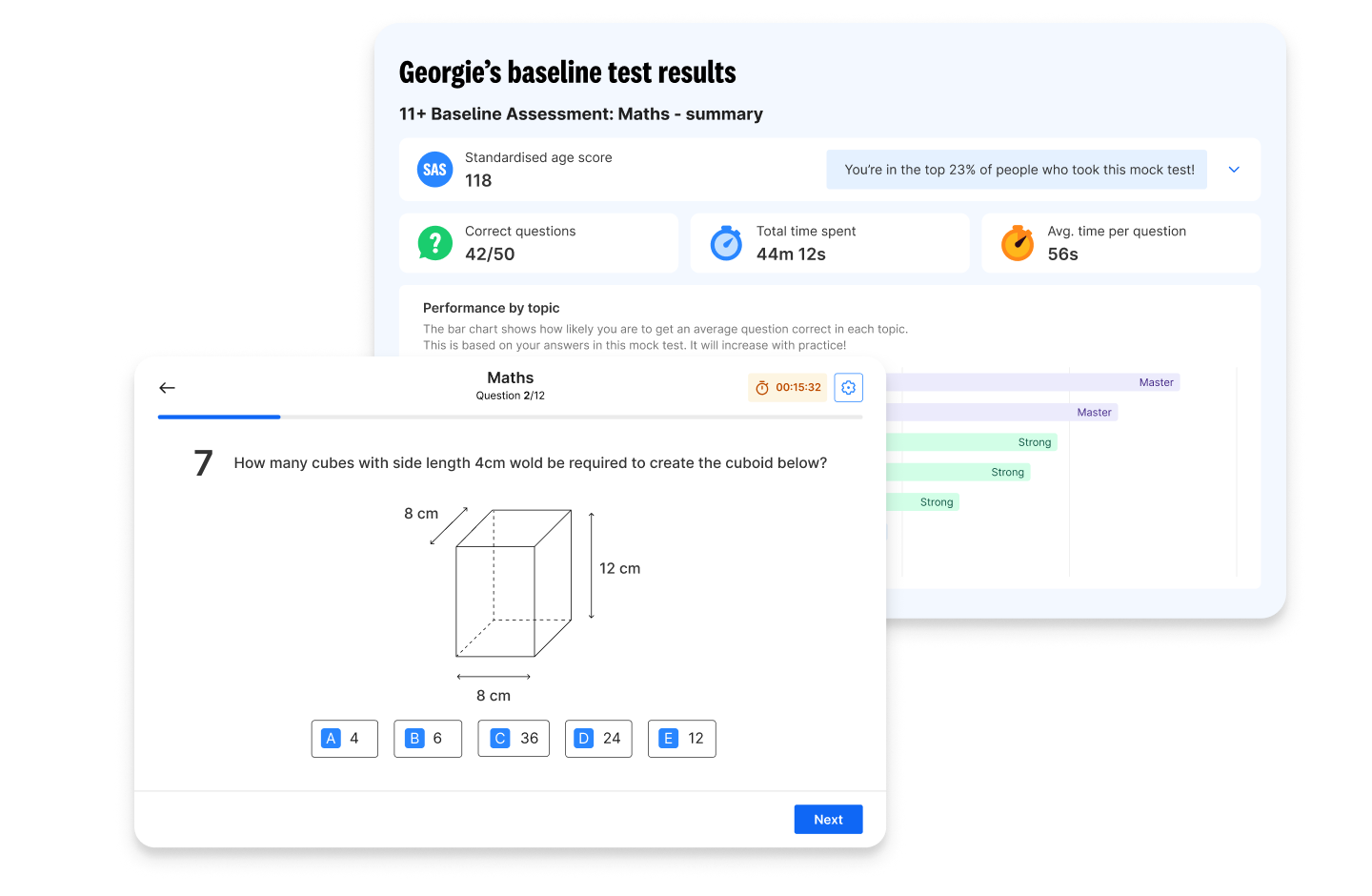
How is the 11 plus marked?
Scoring and marking depends on your target school’s exam provider.
The Kendrick School 11 plus and the English and maths papers in the Reading School 11 plus are marked using a process called Optical Mark Recognition (OMR). This scans the answer papers to detect the marks your child has made to indicate which answer or answers they think are correct.
The Cambridge Select Insight assessment for Reading Girls’ School’s selective stream is taken online and marked automatically.
The creative writing paper for entry to Reading School is marked internally by school staff.
All three schools’ tests (with the exception of Reading School’s creative writing paper) are age-standardised based on your child's age in years and months at the time of taking the test. This is to ensure that younger children aren't disadvantaged. Standardised age scores normally range from 60 to 142, where a score of 100 represents the average for the year group. Grammar schools are normally looking for children whose scores place them above average.
After the tests are standardised, children are usually ranked in order from highest score to lowest score.
What's the pass mark for the 11 plus in Reading?
Each school has its own factors for deciding which children are eligible for a place at the school.
Girls applying to Kendrick School are allocated places based on their total standardised score in the ranked list. The school has a priority area, so children living within this area are prioritised for places.
Boys applying to Reading School need to achieve an ‘eligible score’ to be considered for a place at the school. If they achieve an eligible score in the rank order of standardised scores, their creative writing test will be marked. If they then meet a minimum standard in their creative writing test, they will be eligible for a place.
Girls applying for one of the 42 places on the selective stream at Reading Girls’ School are ranked according to their final standardised score.
How to apply to Reading grammar schools
If you're considering a grammar school for your child, it's a good idea to speak to your child's teacher first.
Grammar schools are academically-selective and select children working towards the top of their year group. Your child's teacher will be able to indicate whether they think your child will be able to keep up with the pace in a grammar school.
1. Register for the school’s entrance exam
To apply to a grammar school, you need to complete a registration form – sometimes known as a Supplementary Information Form (SIF). This will be available on your target school’s website.
The grammar schools in Reading open their 11 plus registration in the spring of Year 5. The deadline varies for each school, but is usually in April or May. 11 plus exams then take place in the autumn term of Year 7.
If you are considering grammar schools elsewhere – such as in Slough or Buckinghamshire – remember to register for their exams too.
2. Apply for school places
You will be sent your child's results in October 2025.
You can use the results to decide which schools to include on your secondary school common application form. Before listing a school on your form, check its admissions policy and make sure your child is eligible.
The application form must be submitted to your home local council by 31st October 2025.
3. National school offer day
On 2nd March 2026, will find out which school your child has been allocated a place at. They will be allocated a place at your highest-preferred school for which they meet the entry criteria and which has places available.
If your child was not allocated a place at your first-choice school, you have the right to appeal the decision. You should contact your child’s headteacher to discuss whether a request for a review can or should be made.
How can I help my child prepare for the 11 plus?
The 11 plus is designed to be challenging. Here are our top tips to help your child prepare for the exam in September 2025.
Bitesize learning
It’s important to build a good knowledge base before the 11 plus. Using a ‘little and often’ approach when learning is key – our brains encode new information more effectively when dealing with smaller ‘chunks’ of information. For children aged 10–11, child psychologists recommend regular study sessions of 20–30 minutes.
Atom Home makes learning a more enjoyable process for your child. They'll explore exciting worlds full of interactive questions, earning coins to spend in the Atom shop. Atom adapts to your child, showing them questions at just the right level of difficulty to keep them motivated.
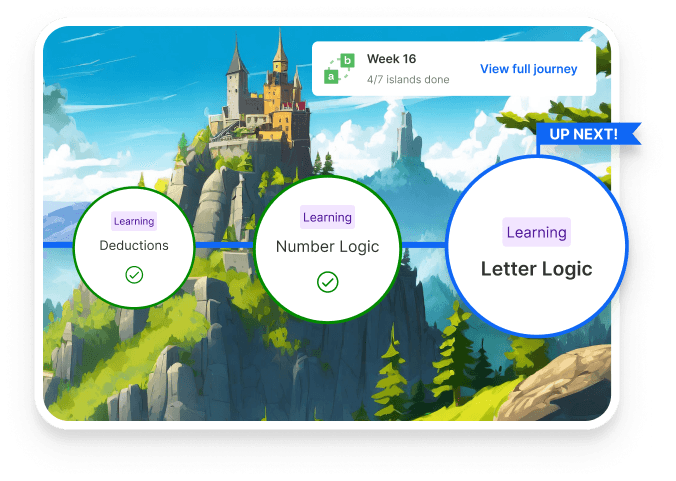
Read widely
11 plus exams test your child’s ability to analyse and interpret written information. Regular reading is a great way to help your child build these skills.
Encourage them to read books from different genres and by a diverse range of authors. Increasing the variety of your child’s reading will help them understand different styles, tones and purposes. Meanwhile, reading a little every day will help widen their vocabulary, sharpen their analytical thinking, and enhance their imagination.
Refine exam technique
When your child feels confident with the topics they’ve learnt in Year 5, they’ll be ready to put their knowledge to the test.
Practice tests can help your child develop problem-solving skills and build confidence working under test conditions. They’re also a great way to consolidate learning and highlight knowledge gaps for further improvement.
With Atom Home, you'll unlock online mock tests and printable practice papers. Enjoy automatic marking and progress tracking with the online tests, and help your child get familiar with the real exam experience with printable practice papers.
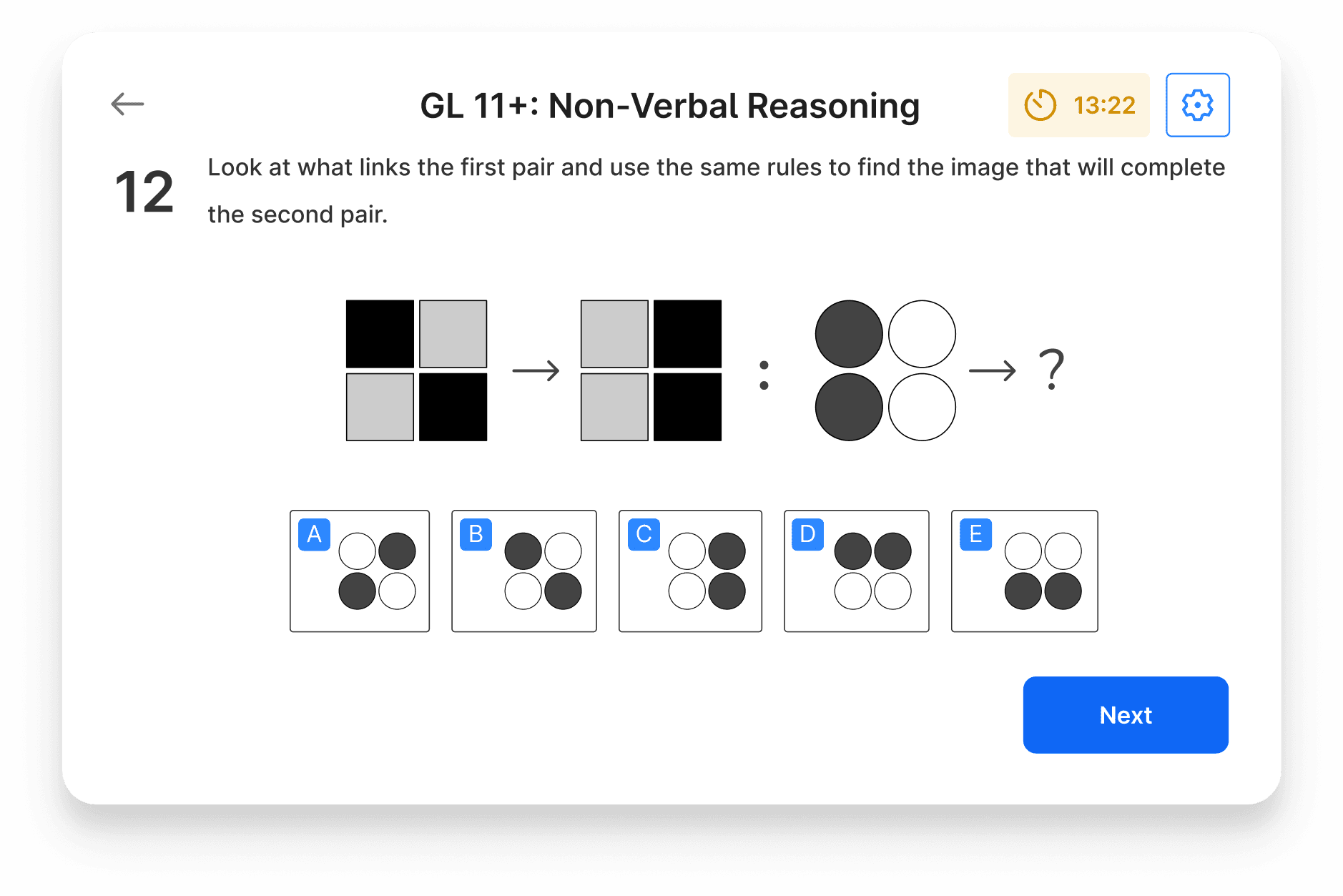
Celebrate progress
Setting regular, achievable goals and celebrating your child’s progress – no matter how big or small – will help keep their motivation high.
Make sure to encourage a growth mindset. This means celebrating effort, as well as achievement! When your child makes mistakes or struggles to understand a particular topic, help them understand that they’ll improve through practice. Regular praise will help your child improve their resilience when tackling new and challenging topics.
Take control of your child’s 11+ preparation.
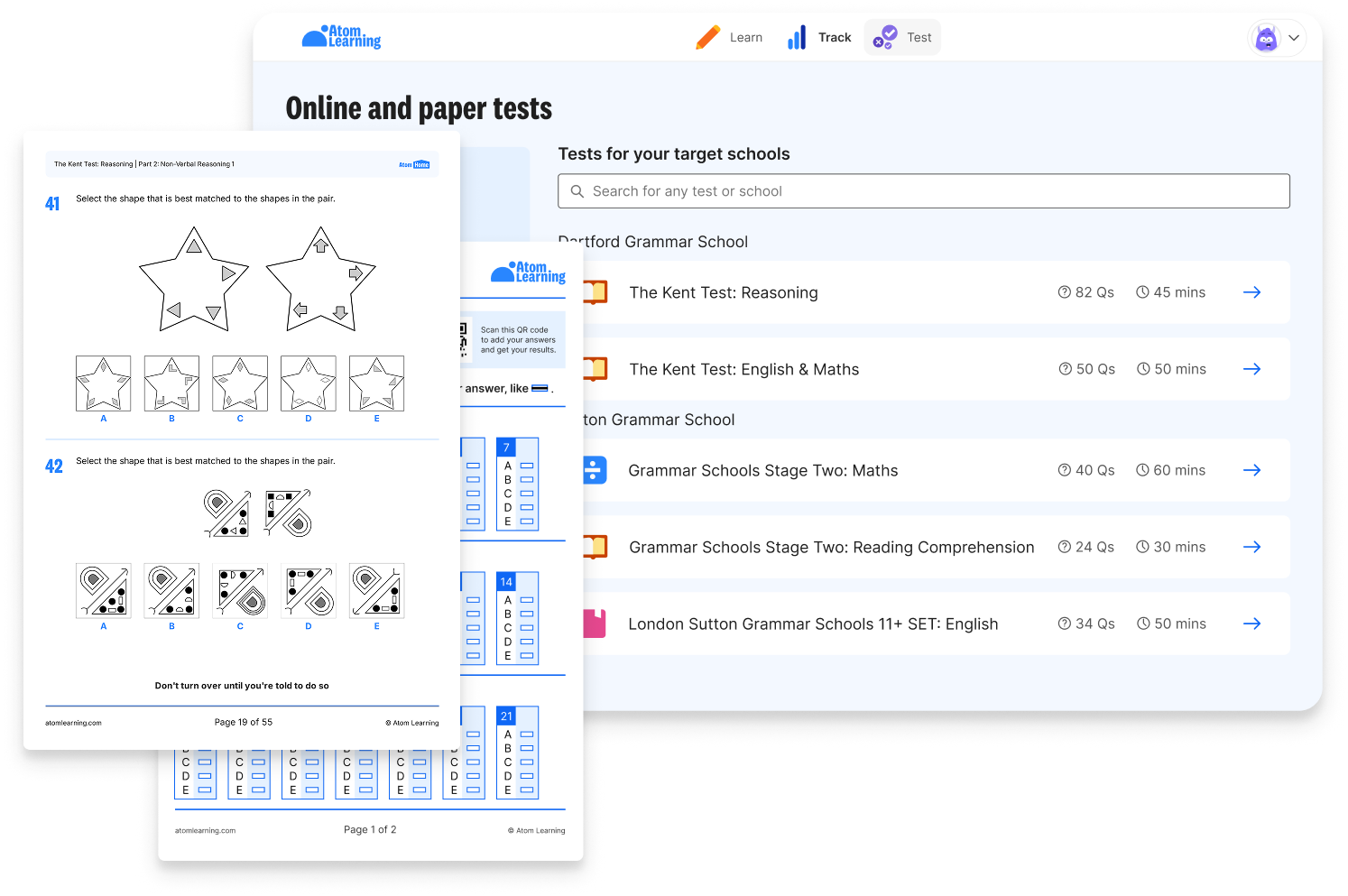
Not sure if your child is on track for the grammar school 11+? You don’t need to guess what to cover or whether they’re ready. Atom shows you exactly what to practise each week and how they’re performing, so you can stay ahead of the process without the stress.
- Follow personalised weekly exam plans that show them what to learn next.
- Download replica 11+ practice papers and upload a photo for instant, stress-free marking.
- Track progress and see how they compare to others applying to the same schools.
Start your free trial and help your child feel fully prepared for the 11+.


